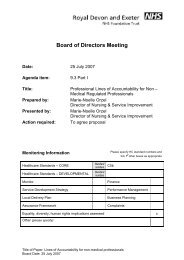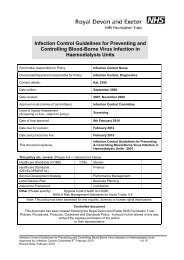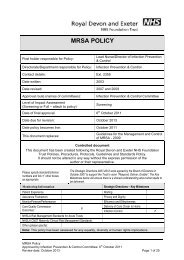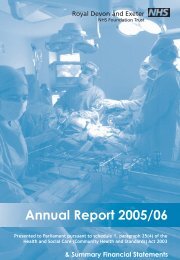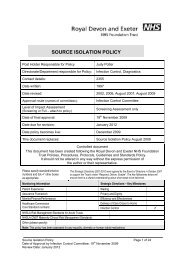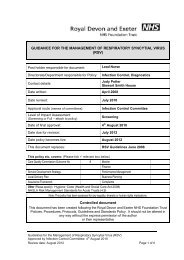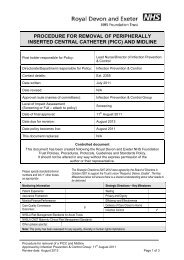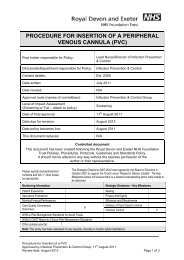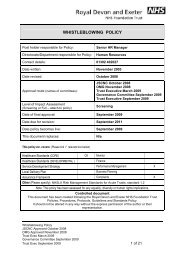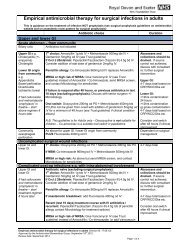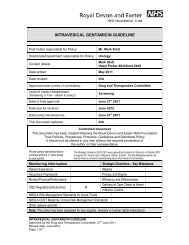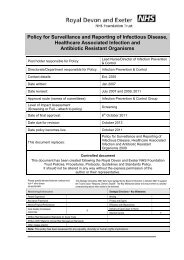Annual Report 2006/07 - Royal Devon & Exeter Hospital
Annual Report 2006/07 - Royal Devon & Exeter Hospital
Annual Report 2006/07 - Royal Devon & Exeter Hospital
Create successful ePaper yourself
Turn your PDF publications into a flip-book with our unique Google optimized e-Paper software.
<strong>Royal</strong> <strong>Devon</strong> & <strong>Exeter</strong> NHS Foundation Trust <strong>Annual</strong> <strong>Report</strong> <strong>2006</strong>/<strong>07</strong><br />
3.3 Risk management training courses are run<br />
on a regular basis to teach the necessary skills<br />
needed to undertake risk management duties. Rootcause<br />
analysis training has also been undertaken to<br />
equip the organisation with the necessary skills to<br />
investigate and learn from more serious incidents.<br />
3.4 Policies and procedures are updated on a<br />
regular basis to offer a benchmark to the Trust on how<br />
to manage risk. Some of these policies, specifically<br />
the risk management strategy, risk assessment policy<br />
and procedure and the incident and investigation<br />
policy and procedure, also inform external<br />
stakeholders on the Trust position in these areas.<br />
4.0 The risk and control framework<br />
4.1 A key element of the risk management<br />
strategy is a standard methodology in which risk is<br />
evaluated. This is via a likelihood-consequence matrix.<br />
The role and responsibilities of key players and all<br />
members of staff within the organisation are also<br />
detailed. The terms of reference of the Governance<br />
Committee and the governance structure is also<br />
highlighted along with the terms of reference of all<br />
committees reporting to the Governance Committee.<br />
4.2 The Trust utilises a risk register in order to<br />
manage both the higher level and Trust-wide risks<br />
that are faced by the organisation. Directorate-based<br />
risk registers have also been developed to enable<br />
directorates to manage the risk assessment process.<br />
4.3 Directorates undertake risk management<br />
activities within their own sphere of responsibility by<br />
holding regular directorate governance groups<br />
meetings.<br />
4.4 The Board has approved an assurance<br />
framework, which covers the key priorities of the<br />
Trust. Where gaps in control or assurance have been<br />
highlighted to the Board, these have been placed on<br />
the risk register. Action plans have been put in place<br />
to address any gaps.<br />
4.5 The assurance framework is split into a number<br />
of areas that include the regulatory, national, local<br />
and commissioner issues. These are:<br />
Monitor;<br />
healthcare standards;<br />
service development strategy;<br />
local delivery plan.<br />
4.6 Primary Care Trust consultations on the wider<br />
aspects of risk (for example, access risk issues) are<br />
undertaken through regular meetings on the local<br />
delivery plan and monthly contract management<br />
meetings.<br />
4.7 Planning risk issues are discussed with the local<br />
authorities via Overview and Scrutiny Committees.<br />
The Trust also involves the media in matters relating<br />
to communication with the public. An example would<br />
be in managing the risks around infection outbreaks.<br />
4.8 Quarterly Council of Governor meetings are<br />
also held to discuss all aspects of Trust business,<br />
including risks, in meeting national targets.<br />
5.0 Pensions<br />
5.1 As an employer with staff entitled to membership<br />
of the NHS Pension Scheme, control measures are<br />
in place to ensure all employer obligations contained<br />
within the Scheme regulations are complied with.<br />
6.0 Review of economy, efficiency and<br />
effectiveness of the use of resources<br />
6.1 Internally, overall performance is monitored<br />
at the monthly meetings of the Board of Directors.<br />
Operational management and the co-ordination of<br />
Trust services is delivered by the Trust Executive,<br />
which comprises the Executive Directors and Clinical<br />
Directors. Performance of individual clinical and<br />
support directorates is monitored informally on a<br />
monthly basis and formally on a quarterly basis via the<br />
quarterly review process.<br />
7.0 Review of effectiveness<br />
7.1 As Accounting Officer, I have responsibility for<br />
reviewing the effectiveness of the system of internal<br />
control. My review of the effectiveness of the system<br />
of internal control is informed by the work of the<br />
internal auditors and the executive managers within<br />
the NHS Foundation Trust who have responsibility for<br />
the development and maintenance of the internal<br />
control framework, and comments made by the<br />
external auditors in their management letter and<br />
other reports. I have been advised on the implications<br />
of the result of my review of the effectiveness of<br />
the system of internal control by the Board, the<br />
Audit Committee and Governance Committee and a<br />
plan to address weaknesses and ensure continuous<br />
improvement of the system is in place.<br />
7.2 My review of the effectiveness of the system of<br />
internal control has been presented and approved by<br />
the Board. The Board and the Governance Committee<br />
have been kept informed of progress against action<br />
plans throughout the year. The assurance framework<br />
includes plans to address any gaps in control or<br />
assurance in order to ensure that continuous<br />
improvement of the system is in place.<br />
7.3 Internal audit has examined the assurance<br />
framework for the Trust and has agreed that it is<br />
satisfactory. The Board will review the process on a<br />
quarterly basis and regular reports are given to the<br />
Audit and Governance Committees. The Trust position<br />
against the core healthcare standards has been<br />
reported to the Board and the Healthcare Commission<br />
via the <strong>Annual</strong> Healthcheck.<br />
7.4 No significant internal control issues (i.e. issues<br />
where the risk could not be effectively controlled) have<br />
been identified in respect of <strong>2006</strong>/<strong>07</strong>.<br />
Angela Pedder, Chief Executive, 25 April 20<strong>07</strong><br />
42



